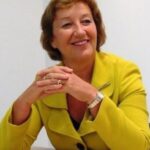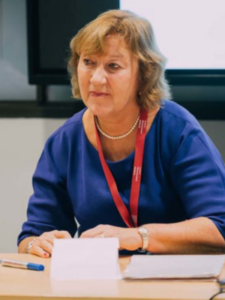Reflections on membership of the Policy and Communications Group at FPM
Posted on: Friday 5 April 2024
Author: Renata Crome

I had the great privilege to serve as a lay member of the Policy and Communications Group (PCG) from 2018-2023. My 5-year tenure provided me with numerous learnings, introductions to a host of academic, pharma and governmental representatives in the healthcare system and the possibility to explore many new experiences and opportunities and contribute to the mission of FPM.
I very much enjoyed being a member of the PCG, I see it as “the voice of FPM”, facilitating liaisons both within the membership and importantly, representing FPM views with external bodies, including media and PR activities and consultation responses. I was able to continue my personal learning by considering the prevailing and future topics of importance to pharmaceutical medicine and contribute to the development and maintenance of the FPM policy platform. I had many new opportunities to support the organisation of and chair symposia, conferences, conversation events and expert groups essential to the external presentation of FPM.
I was introduced to the work of the FPM and the PCG by my good friend and mentor Claire Barton, who chairs FPM’s oncology expert group. She has been instrumental in pointing me to some of the most enjoyable experiences of my career. On retiring from my role as deputy head of Early Development at Roche, Claire said “I will leave you for 2 weeks, then introduce you to other organisations where your experience is needed”, and sure enough she introduced me to 2 organisations, the PTEN Research Foundation where I became and remain a trustee board member, and to FPM where there was a vacancy for a lay member on the PCG, which I applied for and was successful in being appointed.
“I hope this provides some insight into the work of a member of the PCG, the experience that can be gained, the learnings and new collaborations and friends made.”
On joining the PCG I was briefed by the then chair of the group Gillies O’Bryan Tear and Ben Cottam, Head of Policy and Communications at FPM. The objectives and work of the PCG was explained to me, and how the group was structured, with all members taking responsibility for aspects of the work. I was invited to choose which area of the group’s work I wished to focus on, and my initial responsibility was oversight of the FPM Conversations. I was shown how to scan the horizon for topics of interest, select speakers and chair, organise the venue and prepare an annual plan of conversation events.
We were encouraged to gain further experience and move to new activities, hence my next assignment on the PCG was to lead the team organising the FPM annual symposia, and I enjoyed helping to organise 2 symposia. Little did we guess, in January 2020 when we were visiting potential venues to host the November 2020 symposium, how the Coronavirus pandemic would unfold and impact the work of the FPM. We selected a wonderful venue in central London then the tsunami of Covid cases in the UK was unleashed. There was talk of a “lockdown,” so we took the unprecedented decision to cancel the venue and made the recommendation to hold the Symposium virtually online. Taking this decision early in March 2020 meant the team had 6 months to upskill and select an online provider. Even with reduced attendance fees, the conference generated more income than previous years and more attendees.
At this point I had been asked by my ex-colleague Professor Sir John Bell the chief scientific advisor to the government, to work for the government to set up and lead the UK government sponsored Covid treatment programme team, to find and test new treatments for Covid. In turn I invited John Bell to open our FPM symposium with a talk on learnings from the Covid Pandemic. Whilst the theme of the symposium was focussed on the future trends in pharmaceutical medicine, the Covid pandemic pervaded through out the discussions. I had the privilege to chair that symposium, and I went on to introduce our other plenary guest speaker Professor Sir Mene Pangalos Head of R&D at Astra Zeneca. He had prepared a truly inspirational talk on future therapies enabled by innovative technologies. However various media stories on the AZ vaccine had broken overnight, and as Mene’s pre recorded lecture was being broadcast over the virtual platform, from a separate “virtual room” Mene and I could see dozens of questions on the AZ vaccine being submitted by FPM members. We quickly conferred and decided to prioritise the “elephant in the room,” I had to quickly triage the questions to avoid duplication, Mene answered each one I posed to him fully and we even managed to squeeze in a few on the topic of his lecture at the end.

The impact of the Covid pandemic on the work of the FPM and PCG, led to another interesting opportunity for me to help. From the outset of the pandemic, the expertise of members of FPM and our neutral charitable position was sought for input to media enquiries, with numerous requests for written and at times speaking slots on various media platforms. We started off overseeing the management of these requests by a subset of the PCG, together with co-opted infectious disease experienced FPM members and the FPM executive. Then, when the volume of enquiries and requests increased, the FPM president Flic Gabbay created a new FPM Covid expert group which she asked me to chair. Members of this expert group provided dozens of statements to the press and interviews on radio and television, we participated in numerous NICE consultations on new Covid therapeutics and treatment guidelines and published a series of educational blogs for the benefit of the FPM membership.
A key deliverable from the FPM Covid Expert group was to harness the internal FPM expertise and externally by organising the COVID-19 ‘DEfining MEdical Needs and eviDEnce’ (DEMENDE) multidisciplinary workshops. The outputs from the workshops have suggested approaches to encourage, incentivise and innovate in R&D and optimise the use of medical interventions in COVID-19 healthcare.
Two multidisciplinary workshops were held in March 2022. They involved chief medical officers, R&D and medical affairs staff from the UK and US from pharmaceutical companies with COVID-19 products on the market in UK, specialists from FPM with antiviral R&D or medical affairs experience, academics, clinical healthcare professionals, patient care representatives and policymakers. The workshop report can be found here. The 50 plus workshop participants made a number of key recommendations, many of which are now being implemented including a) what is needed to be done in research and development to deliver treatments across the lifecycle of a pandemic for different populations b) how to share information and education and c) reflect on the impact of Covid and learnings for other diseases .
At the end of the active phase of the Covid pandemic, the FPM Covid Expert Group was absorbed into the newly created Infectious Disease Expert group as part of the review and enhancement of the FPM expert groups, undertaken by the new chair of the PCG, Birge Berns. As a PCG member I could contribute to this re-evaluation and the new ID expert group could return to the normal working style of the other expert groups.

My most recent work on the PCG included taking on the chair of the new Infectious Disease Expert group and re-establishing the scope and remit of the group. We have continued to accept several invitations to participate in NICE consultations on Covid treatments, we have produced an educational blog on HIV and recruited expert group members with antibiotic expertise to investigate the big issue of resistance to these therapies.
I hope this provides some insight into the work of a member of the PCG, the experience that can be gained, the learnings and new collaborations and friends made. Around the time of my 5th anniversary on the committee, I received 2 new opportunities, to join the board of a start up company working on a lifesaving new device, and to join the faculty of pharmaceutical sciences as a lecturer at my local university. I decided that it was timely to handover my membership of the PCG to other FPM colleagues with fresh ideas, who might be seeking the opportunities provided by the PCG work and I have accepted the two new roles offered to me.
